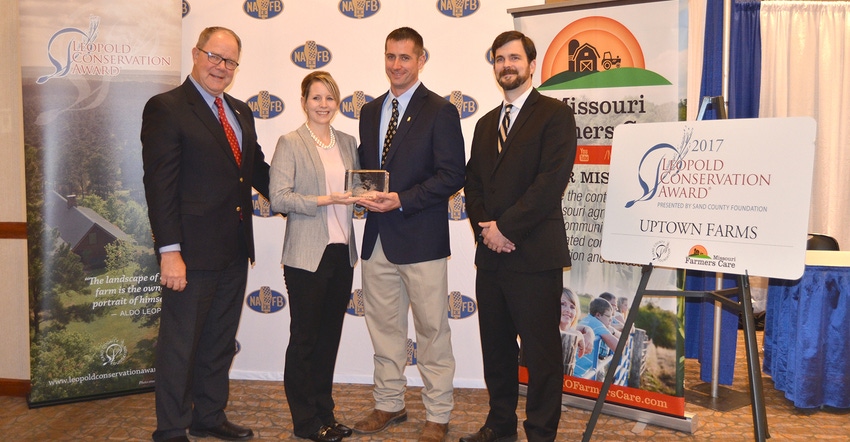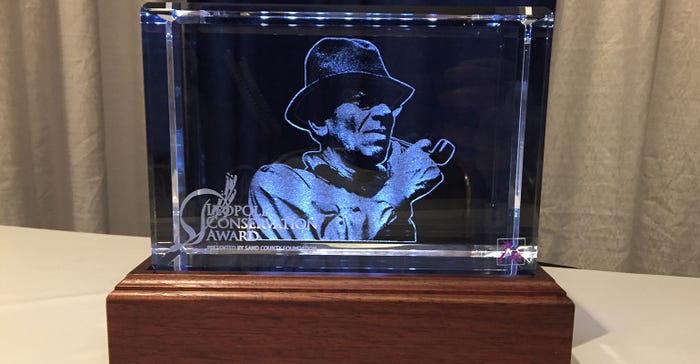
Like many young farm kids, Kate Lambert's young son Meyer has a favorite book. It includes pictures of fields and farm machinery. As he flips to the page with a really big old plow, he tells his mom, "We don't use that — that kills earthworms."
Despite his age, Meyer already knows about the family's commitment to the land. "It is fun to see that at the age of 3, he is already starting to understand that Dad and Grandpa are already doing some things to make the farm different," Kate says.
Matt and Kate Lambert own Uptown Farms in Laclede, Mo. Their farm consists of 2,000 acres of row crop and hay production, commercial Red Angus cattle and a small flock of Hampshire and Dorper sheep. The Lamberts have transitioned their farm to completely no-till, and they use cover crops to enhance soil health while minimizing soil erosion and runoff.
For their efforts in land stewardship, the Lamberts of Uptown Farms won the inaugural Missouri Leopold Conservation Award. "This award recognizes the best of the best in land stewardship," according to Lance Irving Leopold Conservation Award Program director. "It is designed to bridge the gap between agriculture and conservation." Missouri Farmers Care, Missouri Soybean Association, Missouri Soybean Merchandising Council, Missouri Cattlemen’s Association, Missouri Corn Merchandising Council, Missouri Department of Conservation, MFA Inc., Missouri’s Electric Cooperatives, Missouri Association of Soil and Water Conservation Districts, Missouri Soil and Water Conservation Program, and USDA NRCS sponsor the award, which includes $10,000 and a crystal depicting Aldo Leopold.

TOKEN OF STEWARDSHIP: A crystal depicting Aldo Leopold was presented to Matt and Kate Lambert of Linn County, Mo.

Changing the game
Matt returned to the family farming operation after graduating college. He brought with him a few new ideas, thanks in part to a college professor. "She really taught us about organic matter and soil health," he says.
So the father and son added cover crops to grazing acres for the cattle operation, because pasture was limited. In the end, they found out that when growing those cover crops, there was a lot of benefit to the cash crops during the summer months."
They began sowing cover on all of their cash crop acres. "We are finding benefits in yield, soil health and the environment on our farm," he says.
But Matt is quick to point out that cover crops are not a "new" technique. "I've been having conversations with my 85-year-old grandad. He planted cover crops and plowed them under," Matt says. "Now, we are terminating with chemical and planting into them."
He says that there has become a better understanding of the use of cover crops over the years and their benefits for the soil.
Influencing others
The Aldo Leopold Conservation Award is given in honor of renowned conservationist Leopold and recognizes extraordinary achievement in voluntary conservation. It inspires other landowners through these examples and provides a visible forum where farmers, ranchers and other private landowners are recognized as conservation leaders.
In the Lamberts' home county in north-central Missouri, there are more cover crops being planted. "It is rewarding driving through the county and seeing the cover crop fields starting to green up," Matt says, "Six or seven years ago when we first started, we were not seeing those fields. Farmers are planting a lot more."
He says that is good news for the next generation.
Connecting to conservation
Making a healthier environment for the soil makes it more productive for the long haul. "The fact is, they are not making any more land," Matt says. "We have to do a better job of taking care of it for future generations."
His dad laid that groundwork. "He instilled in me to take good care of the ground and leave it in better shape than it was handed to him."
When Matt and Kate purchased their own farm, they started using conservation practices like no-till and cover crops. "I want to leave it to the boys better than I received it," he says. "Conservation is a way to sustain the farm. It will be interesting to see what they can do with it in the future."
One thig is for certain — Meyer and his older brother, Mace, will not be running that big plow from the pages of their book any time soon.
About the Author(s)
You May Also Like






